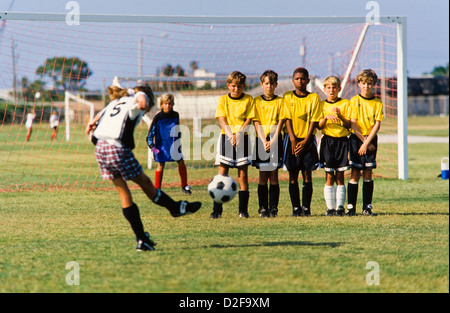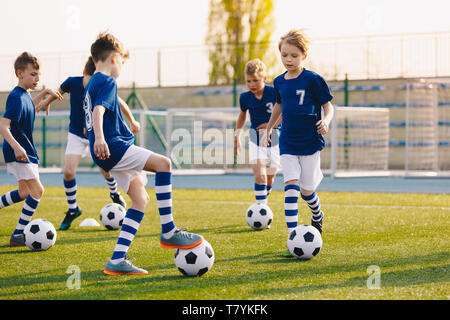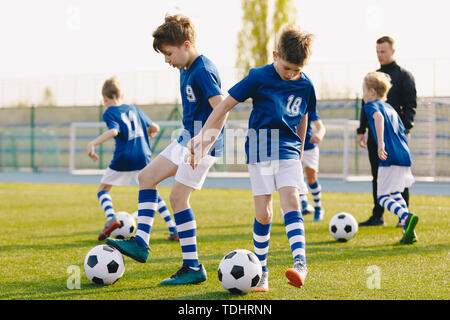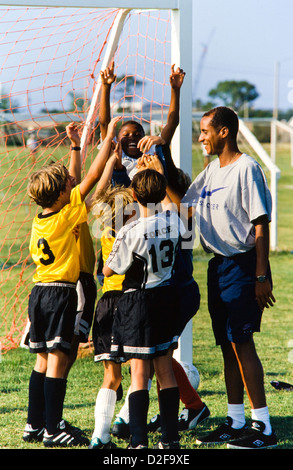Open Kids Soccer Team: Nobody wants to get cut. To give yourself the best chance of making the team.
You can learn to improve your fundamentals and learn to practice well.
Being a coachable team player who will be a great addition to any team.
Make yourself stand out from the crowd the right way.
Kids’ soccer is so prevalent, playing is almost a rite of passage for children.
Open Kids Soccer Team
And of course, the game is popular among fans all around the world—even more popular than it is in the United States!
While it seems like every kid takes a turn on the field, is soccer really right for your young athlete?
Make an informed decision.
If you want to learn how to form a new team, read this article.
Related: 15 Tips to Develop Soccer Dribbling Skills in Nigeria

Open Kids Soccer Team
1. Get the Basics of Soccer for Kids
Soccer (called “football” outside the United States) is played on a rectangular turf field with a goal at either end. Teams compete to place a ball into the opposing team’s goal. Players must use their feet, heads, or torsos to propel the ball; only the goalkeeper can use their hands or arms to stop the ball from entering the goal. Boys and girls both play (often on coed teams when they are young).
Age kids can start: 4 (American Youth Soccer Organization); 5 (US Youth Soccer Association). Some cities or recreational centers may offer soccer programs for kids as young as 3; the game is easy for kids to pick up at a young age.
Skills needed/used: Teamwork, endurance, speed, agility/footwork (handling ball with feet)
Best for kids who are: Social (enjoy team play), high energy
Season/when played: Spring, summer, fall; year-round in many areas; indoor soccer leagues are also available. The game is slightly different when played indoors (officially, it’s called “futsal”).
Team or individual? Two teams of 11 players each; short-sided teams (with fewer players) are common for children under 10 and allow more playing time for each child.
Read on:12 Tips to Build Soccer Strategy in Nigeria
Open Kids Soccer Team
2.Know the age group levels:
Age-grouped and school-affiliated teams, up through high school and college. Starting as early as age 7, kids in many areas have the option to play in either a competitive (traveling) or noncompetitive extracurricular league. Talented players may be selected for elite leagues, training camps, or development academies.
3. Know the Fitness factor:
High. All players except the goalie spend most of the game running. Coaches should encourage every child to have lots of opportunities to play during practice and games. At practice, all players should have their own balls to use in drills). Soccer builds aerobic fitness, leg strength, and balance.
See also: Top Real Estate Investment Opportunities in Nigeria
4. Get all the Equipment:
Soccer shoes with rubber or molded plastic cleats, shin guards (look for the kind with built-in ankle protection), uniform, ball (smaller, lighter balls are available for younger children).
Open Kids Soccer Team
5. Practice the ball control.
To give yourself the best chance of making the soccer team, work on your fundamental ball skills on your own time. While strategy and teamwork can be coached, you can build fundamental skills on your own to put yourself ahead of the curve. If everyone else is ready to learn strategy and plays, but you’re still working on your dribbling, you’re likely to be cut.
- Practice dribbling, keeping the ball in as close as possible to your body, and keeping your head up while you dribble.
- Practice trapping the ball with your feet, your thigh, and your chest, and making controlled touches as you dribble.
- Practice your passing, making short, crisp passes that stay close to the ground.
Read on: How to Check for Business Name Availability in Nigeria
Open Kids Soccer Team
6. Practice with the the shooting skills.
Accurate shooting is another essential skill for offensive players, and knowing how to score can make you stand out during tryouts. Practice your foot placement and your accuracy.
- Practice your approach to the ball, placing your plant foot just behind the ball when you want to get some air under it, and just ahead of it when you want to keep the shot low. Practice driving the top of your foot, along the laces, through the ball, keeping your head down as you shoot.
- Not all players need to be able to shoot the ball, but learning to make accurate passes and crossed is a good skill for all players. If you’re a defender, practice taking free kicks and corner kicks, passing to open players, instead of working on your shot placement.
See also: 10 Steps To Business Procurement Cycle in Nigeria
7. Teach them to practice with both feet.
Learning to play from both sides will make you a versatile player, someone who can fill in all over the field. It’s very difficult to cut a player who is equally effective on the right and the left, so it’s smart to work on developing your weak side as much as possible.
- Practice controlling your short dribbles as you run at high speed with your weak-side foot. If you can do this, you’ll be an effective ball handler.
See also:How to Start Candle Making Business in Nigeria
Open Kids Soccer Team
8. Practice the footwork and defensive skills.
Learning to get the ball from your opponents is just as important as what you do with it. Soccer is a fast-paced game that shifts back and forth between offense and defense, meaning that even primarily offensive players need to learn to mark-up and intercept the ball.
- Do lateral runs, moving your feet from side-to-side, to keep your shuffle step faster than the competition.
- Practice your vision as well, working on your visual acuity, to keep your eye-on-ball skills sharp.
Read on: Business Communism/Socialism in Nigeria
9. Teach them to increase their cardio endurance.
Soccer players run an average of 2-5 miles per game (or about 3-8 kilometers), and by some estimates as many as 7-10. While you may not run quite that much at the youth level, it’s still true that soccer requires great endurance and stamina, meaning you’ll need to build up your breath-support and ability to run around at high speed as much as possible.
- Even if you’re not a big fan of running, try working on your distance endurance, running at a low or moderate speed for 15 or 20 minutes at a time.
- Many teams do team workouts and strength training over the summer, before the season starts. If you want to make the team, it’s important to go to these workouts.
See also: How to Start Fruit Farming Business in Nigeria
Open Kids Soccer Team
10. Let them become a student of the game.
If you want to make the team, watch professional soccer matches. Go to games and watch in person, or watch on television, to get more a sense of strategy and off-the-ball motion. Learn as much as you can about your sport, and how to play it well.
- Try keying in on a single player and watching how they negotiate the game, rather than just watching the ball. Where does your player move, off the ball? What does your player do that you wouldn’t do?
Read on:How to Start Shrimp Farming Business in Nigeria
11. Try and identify their weaknesses and target them with drills.
Every player needs to work on something, and learning what your weak spots are is an essential part of making the team. Showing that you’re committed to improvement will make you stand out from the field. Listen to your coaches to find out what your weak spots are, and try to identify them yourself.
- Do your passes often get intercepted? Work on making sharper, more accurate passes and keeping your head up to look for available options on the field.
- Do you often get beat to the ball? Work on getting faster, increasing your cardio endurance and your on-field awareness.
- Do your fundamentals need work? Practice dribbling, shooting, and trapping the ball with both feet.
Open Kids Soccer Team
12. Let them move to space.
At the youth level, soccer games often look like a 20-headed mob running after the ball all at once. It works for rec soccer, but if you’re going to start competing for a team, it’s essential that you learn to space out and move around to give your teammates passing options and spread the field out. Coaches try to teach this more than almost anything else, and the more a sense of moving to space you demonstrate, the better chance you’ll have of making the team.
See also: Top 20 Business Advise Tips in Nigeria
Open Kids Soccer Team
13. Let them play their position’s role.
Depending on what position you want to play, and what skills you’re naturally good at, you need to learn the role of the position you’ll likely be placed at, and stick to the role as much as possible. Defenders don’t need to be moving up field and asking for passes, just as strikers don’t need to be coming way back on defense all the time.
- The striker’s job is to take passes and score points. These players are generally the quickest and most accurate shooters on the team.
- Center midfielders are the field generals, controlling the flow of the ball and the tempo of the game. Their job is to feed the ball to the strikers, or out to the wings, and to defend attacks in the center of the field. Center midfielders play both defense and offense.
- Wing midfielders’ job is to spread the field out and make crosses in to the strikers, to try to score. Typically, wings will do the most running on the field, going all the way up on offense, and coming all the way back on defense.
- Defender’s are the last line between the offense and the goal. Their job is to mark up on the strikers and cut off the passes that come to them, keeping them from shooting.
See also:How to Become a Mobile Marketing Master in Nigeria
14. Be vocal.
Like most team sports, soccer requires lots of communication to keep things flowing and effective. If you want to be a good team player and give yourself the best chance of making the team, you need to be a talker on the field.
- If you’re open, call for the ball and call out your placement on the field. Sometimes, players will yell “square,” when they’re at a right angle to the player with the ball, and “line” when they’re straight back or straight ahead and open.
- It’s also good to warn your teammates of oncoming defenders, or warn your defensive teammates of an impending attack.
Open Kids Soccer Team
15. Let them stay hydrated.
They will run out of gas quickly unless you learn to stay well hydrated and in shape during practice and games. Your body needs to be a well-tooled machine, and it’s important to treat it right. Make sure you get enough sleep the night before practice sessions, and drink plenty of water before you do practice.
- Sports drinks are sometimes good for recovery, but they can be filling during your workouts. try to stick to plain water, then have a sports drink afterward to replenish your electrolytes.
Read on:Top Ten Businesses You Can Start With Small Capital
16. Teach them to listen to instructions closely.
The best way to make any team is to do what you’re asked, without offering any resistance. If you’re supposed to be doing drills, you don’t want to be the one who has to ask how to do them, if it’s already been explained. Listen closely at all times and pay attention while you’re at practice, instead of messing around with your friends.
- It’s also important to listen to ways that you can improve. If your coach, or a teammate, is yelling encouraging instructions from the sideline, you need to have your ears open, so you can hear them.
Read also:Top 25 Nursing Business Ideas & Opportunities in Nigeria
17. Teach them to listen to the coach.
Just as important as your talent and natural abilities will be your ability to improve on the field. Coach ability is one of the most important things that coaches look for in players on any team, and if you want to be picked to play, you need to demonstrate that you’re willing to learn, excited to improve, and are willing to do what it takes.
- If you feel like you might not make the team, talk to your coach one-on-one and ask what you need to do, specifically, to make sure that you make the team. This demonstrates a serious commitment and a desire to compete.
Read on:How to Start Trucking and Haulage Business in Nigeria
Open Kids Soccer Team
18. Teach them to support their teammates.
If you’re not offering a supportive environment for other players, you’re going to be cut. Even though it is a competition to make the team, coaches are looking for players who will put the good of that team before their own individual wants and needs. Be a team player and you’ll stand out from the crowd.
- A chain is only as strong as its weakest link. If someone is hanging back and struggling with a drill, encourage them and help. Drop back to run with a teammate who’s feeling winded. Encourage your teammates when they need it.
- If a teammate gets punished and has to run a lap all alone, gather your teammates to do it together. Take every punishment as a team. Coaches love that kind of thing.
20. Teach them to demonstrate their desire to win.
Coaches want competitive players, players who will leave their blood and sweat out on the field to score points and to win. If you lollygag during competition drills, even if they’re supposed to be fun, you’ll show that you lack that killer instinct, and be a less attractive player. Try hard at each and every drill, during each and every scrimmage, whether you’ve got a chance of winning or not.
See also: How to Invest in Property in Nigeria
Open Kids Soccer Team
21. Let them practice good sportsmanship.
Be a gracious winner and a good loser. Try to win every competitive drill you’re put through, but don’t rub in the face of other players, or brag after you win. No trash-talking. let your skills do the talking for you.
22. Let them leave everything on the field.
Nothing will get a player cut from the team faster than looking bored during practice. If you complain about practice, or give the impression that you’d rather be somewhere else, the coach will make that a reality pretty quick, even if you’re more talented than certain other players.
See also: How Profitable is Recharge Card Printing Business in Nigeria
Open Kids Soccer Team
23. Teach them to be enthusiastic.
The mental game is sometimes the difference between a win and a loss. Every team needs enthusiastic players from the sidelines, supporting the players on the field. If you’re not the best player out there, but still want to make the team and give yourself a chance, be loud, even when you’re not in the game. If you’re standing up off the bench, with your head in the game, invested in what’s happening, the coaches will notice. They don’t like to cut players who are cheerleaders for the team.
24. Know the time commitment required:
For the youngest children, an hour a week (30 minutes practice, 30 minutes game). As players move up the ranks, practice time and the number of games increases significantly. Players on competitive teams will travel longer distances to games and usually attend at least one out-of-town, weekend-long tournament per season.
Read on:How to Start Tailoring Business in Nigeria
25. The potential for injury:
Surprisingly high, although three-quarters occur in kids 12 years old and up. Risks of soccer include collisions with other players, the ground, or the goalposts, resulting in sprains, fractures, or concussions; repetitive strain injuries, especially to the ankles and knees and especially in girls; and heat-related illnesses.
See also: How to Invest in Transportation Business in Nigeria
26. Note the Precautions
Precautions taken by players, coaches, and leagues can help reduce risk.
You can get a tip sheet on preventing soccer injuries from the Society for Sports Medicine.
Some former pros, schools, and physicians are now recommending a “no headers before high school” policy. This may help kids avoid some concussions. However, players can also sustain concussions from collisions or falls, so parents should be aware of symptoms and recovery procedures.



Leave a Reply